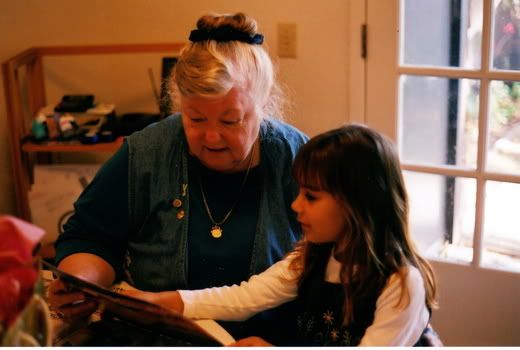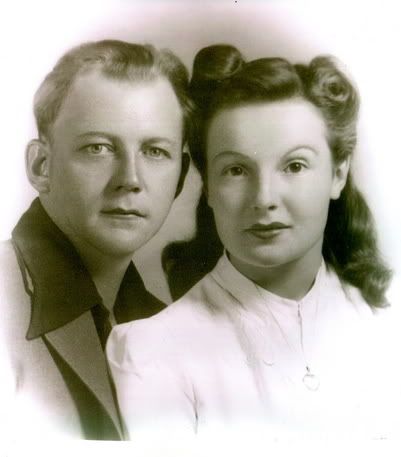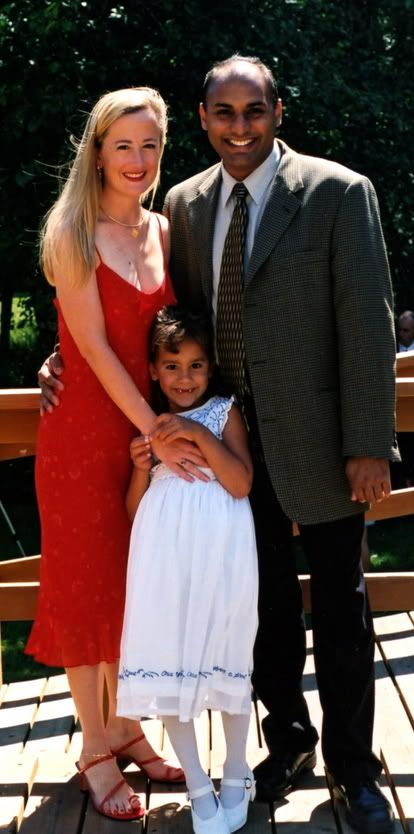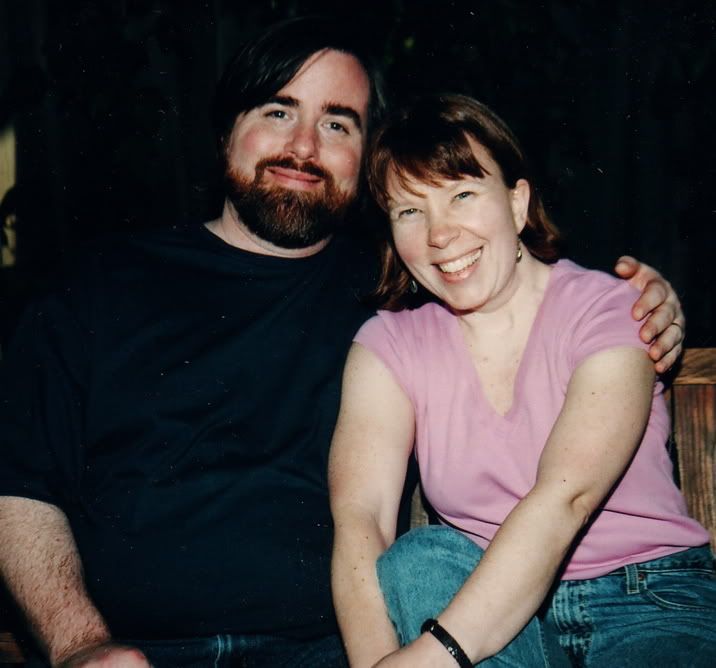Tuesday, October 31, 2006
Easier For Bush To Declare Martial Law
The Starr Hill Halloween Garbage Bear
One summer in 1995, about 2:30 in the morning, while Granny was sound asleep, Missy sat in the bathroom window and talked to an animal outside on the mountain. And the animal answered her back. They talked and talked, having quite a little chat, and eventually they got so noisy, that Granny woke up. "What in heavens name woke me up?" she asked herself. And then she heard it, the dialog in the bathroom. "Meow, meow, meow," said Missy. "Unghh, unghh, unghh," came the answer from the mountainside outside the window. "Goodness gracious," said Granny, "whatever has Missy made friends with now?" Granny asked this question because she knew that Missy will make friends with anything too big for her to hunt herself that doesn't hunt her. Other cats. Dogs. Ravens. Porcupines. (Although, unlike Abe, she doesn't go up and sniff porcupines from behind. She tries to sniff them nose to nose from the front, and when they turn their backs on her, she leaves them alone. So she doesn't get a nose full of quills when she sees them.) So Granny got up and went into the bathroom to see what Missy had made friends with this time (the unghh, unghhs being friendly noises, after all. It was also somehow a small noise. Not like a large animal, but like an animal about the size of a raccoon. Although, since Granny had never heard a raccoon, she wasn't sure that one would sound like that.) When she looked out the window, she couldn't see a thing on the side of the mountain, even though it was summer and so the sun was already out. So Granny had to climb up on the counter and look out the window and down the mountainside. And there was a bear cub!
 "Goodness gracious!" said Granny. "Missy, you haven't any sense. Don't you know that that is a bear cub? Don't you know that wherever there is a bear cub there is a bear mama not very far away? What are you doing? If that cub decides to come in the window to visit you, he can do it easily," said Granny, looking at the gentle slope between the mountainside and the bathroom window. She knew a person couldn't get in that window, but a bear cub would have no trouble at all. "And don't you know, you silly cat, that if Baby Bear came in the window, Mama Bear would follow? No self-respecting Mama Bear is going to let her cub climb into a strange house and not go after it." And Granny pictured Mama Bear following the cub into the bathroom, and then the two bears being trapped in the house and frightened. Just about the last thing in all the world that Granny wants is to have a frightened Mama Bear trapped in her apartment trying to protect her cub. "Why, Missy, don't you know there isn't a single interior door in this entire apartment?" she asked. And she pictured Mama Bear chasing Granny and Missy up and down the stairs, and them without a single door to close behind them. And she didn't like that picture at all.
"Goodness gracious!" said Granny. "Missy, you haven't any sense. Don't you know that that is a bear cub? Don't you know that wherever there is a bear cub there is a bear mama not very far away? What are you doing? If that cub decides to come in the window to visit you, he can do it easily," said Granny, looking at the gentle slope between the mountainside and the bathroom window. She knew a person couldn't get in that window, but a bear cub would have no trouble at all. "And don't you know, you silly cat, that if Baby Bear came in the window, Mama Bear would follow? No self-respecting Mama Bear is going to let her cub climb into a strange house and not go after it." And Granny pictured Mama Bear following the cub into the bathroom, and then the two bears being trapped in the house and frightened. Just about the last thing in all the world that Granny wants is to have a frightened Mama Bear trapped in her apartment trying to protect her cub. "Why, Missy, don't you know there isn't a single interior door in this entire apartment?" she asked. And she pictured Mama Bear chasing Granny and Missy up and down the stairs, and them without a single door to close behind them. And she didn't like that picture at all.So Granny closed the bathroom window, and went back to bed. That kept Missy and Granny safe, and bear prints off the rugs, but it made it warm in the bedroom without the cross breeze, so Granny wasn't best pleased with this solution. But she had no other.
And the next night, the same thing happened. Missy and Baby Bear talking, Granny waking up and having to close the window. For almost three weeks, every night Missy would talk to Baby Bear, and every night Baby Bear would answer, and every night Granny would get up and close the window -- just in case. But, finally, Mama Bear took Baby Bear to another part of the mountain to forage for berries and he didn't come to visit Missy anymore and Granny slept through the nights with her windows open all night again. What a relief, to sleep cool on a hot night. Although, both Missy and Granny missed Baby Bear. He was such a pretty little cub, and so friendly.
 Now, Granny almost forgot about Baby Bear until one morning in mid-October two years later -- a whole year and two months after Maya was born, and Granny had started thinking about her the first thing when she woke up every morning. Granny was taking out the garbage, and the cans were spilled and garbage was spread all over the street. Something had been in them. "I wonder," said Granny "if it was a dog or a bear. Let me think about this, can I figure it out? I know that the lids on the cans were all screwed down tight" she said, looking at the special garbage cans that are supposed to be bear proof, "and I know the bungee cords were fastened. That means it probably was not a dog," said Granny, "it's a rare dog that can pull off a bungee cord and unscrew a lid. But a bear! Yes, indeed. It would have to be a pretty stupid bear who couldn't get into these cans." And so she examined the lids to see if she could find evidence of a bear. "Aha," she said "I see tooth marks in the lids. Big tooth marks. We have a garbage bear! Some silly bear has learned that there is food in garbage cans, and instead of hibernating like it is supposed to, it is staying awake because the food hasn't run out! Those bears won't go to sleep while there is still food, no matter that the days are shorter and the weather is colder." So Granny started to clean up the mess. One of her neighbors came out to help her, and soon all the garbage was back in the cans and the road was clean again.
Now, Granny almost forgot about Baby Bear until one morning in mid-October two years later -- a whole year and two months after Maya was born, and Granny had started thinking about her the first thing when she woke up every morning. Granny was taking out the garbage, and the cans were spilled and garbage was spread all over the street. Something had been in them. "I wonder," said Granny "if it was a dog or a bear. Let me think about this, can I figure it out? I know that the lids on the cans were all screwed down tight" she said, looking at the special garbage cans that are supposed to be bear proof, "and I know the bungee cords were fastened. That means it probably was not a dog," said Granny, "it's a rare dog that can pull off a bungee cord and unscrew a lid. But a bear! Yes, indeed. It would have to be a pretty stupid bear who couldn't get into these cans." And so she examined the lids to see if she could find evidence of a bear. "Aha," she said "I see tooth marks in the lids. Big tooth marks. We have a garbage bear! Some silly bear has learned that there is food in garbage cans, and instead of hibernating like it is supposed to, it is staying awake because the food hasn't run out! Those bears won't go to sleep while there is still food, no matter that the days are shorter and the weather is colder." So Granny started to clean up the mess. One of her neighbors came out to help her, and soon all the garbage was back in the cans and the road was clean again.Granny was very careful what garbage she put in the can, saving food scraps in her freezer until the day the truck came to pick up and even then she put used cat litter on top of it to discourage the bear, and sort of forgot about it until Halloween. She didn't see or hear any evidence of the bear, and so she relaxed. Then, on Halloween, the newspaper and tv news mentioned that parents should avoid taking their children to Starr Hill to trick-or-treat, because a couple of garbage bears had been spotted in that neighborhood. "My goodness," said Granny, "Starr Hill -- that's just around the bend from here. They are talking about my garbage bear. My oh my, they haven't been in our cans lately. They must be getting into cans where the people aren't hiding the smell of food under the kitty litter. Only it isn't one, it is two. I wonder," Granny wondered, "if I know these bears? Could it be Mama Bear and Baby Bear after all this time?" And she wondered about that a lot, but there was no way she knew of that she could ever know.
Now, sure enough, no children came to Granny's door on Halloween. But, then, no children ever come to her door on Halloween, because it is such a high hill to climb, and there are so few people who live at the top, that the children go to other neighborhoods, where they don't have to work so hard to get so little. And on Halloween night, about 1:00 a.m., Granny was sound asleep in bed, and she was awakened by honking horns and flashing headlights. Granny got up and looked out her bedroom window to see what the commotion was all about. It was her neighbors, who live at the other end of the building. The same neighbor who had cleaned up the spilled garbage with her. They couldn't get into their apartment, because the bear was back. He was sitting on top of a garbage can, fishing around in another can for food. When they honked their horn and flashed their lights, thinking to scare him off, he just went under their staircase and hid. That was very bad, because the neighbors had to climb that very staircase to get into their apartment. They couldn't do it with a bear under the stairs!
"Oh my," said Granny, "now we have a problem. Those poor people can't sleep in their car. And they don't dare try to climb the stairs to their apartment. That would just scare the bear and he might chase them or even hurt them if he thought they were trying to hurt him." And Granny couldn't think what to do (although the very next day she realized that if she had called 911 the police would have sent someone from Fish and Game who would have known what to do. Her only excuse for not thinking of it at the time is that she had been asleep, and she isn't really good at thinking of anything until after she has thought of Maya, after all. And with a bear right outside keeping the neighbors out of their apartment, well, Granny hates to admit it, but this time she didn't think about Maya until after the bear went away.)
And then Missy climbed into the window that Granny was looking out of. "Meow, meow, meow," she said. "Unghh, unghh, unghh" answered the bear in the friendliest manner possible. "Goodness," said Granny, "that foolish garbage bear is our very own Baby Bear. He is supposed to be hibernating. I thought surely Mama Bear had taught him better than this." Granny took another look out of the window, "Well, well," she said, "Baby Bear has certainly grown big. Probably pretty strong, as well. I wonder if he still hangs out with Mama Bear, or if he's on his own these days?" But since Baby Bear doesn't speak English, and Granny doesn't speak bear, there was no way to find out. Finally Baby Bear went away, no one knows why, and the neighbors were able to get out of their car and go to bed. Maybe Missy told him to. Or maybe he just got bored with sitting under the stairs while the lights flashed and the horn honked. And if he had stayed longer, maybe Granny would have thought of calling 911 that night. Granny hopes she would have.
A few days later, there was an article in the paper which read:
Downtown problem bear capturedAnd then, that night on the news, there was a report that the bear had been released out-the-road, where there are no garbage cans. "Well," said Granny to Missy, "I'm glad Baby Bear has been moved out-the-road, where he will be encouraged to hibernate by the lack of garbage cans to raid. I do wonder if that other bear is Mama Bear. Could be." And then she looked sternly at Missy and said, "See what you did? Taught Baby Bear that this was a good place to hang out, and then when the berries were all gone and it was time to hibernate he remembered our place and came back and found garbage. I told you talking to bears wasn't a good idea." But who knows if Missy learned a thing from it? And who knows if Granny really wanted her to?
Juneau — One of the furry thieves that has raided Starr Hill garbage cans in recent weeks has been taken into custody.
The thief may qualify for an early release, however, since it's a black bear.
Captain Michael DeCapua, spokesman for the Juneau Police Department, said officers responded to their first bear report last night shortly before midnight on Starr Hill, but the bear was gone before it could be found.
About an hour later, more bear calls came in from the area on the slopes of Mt. Roberts above downtown.
"We received a report from several people in the Fifth and Nelson street area," DeCapua said. The callers said a bear had been caught in a trap and was trying to break out.
Police called Matt Robus, a wildlife biologist with the state Department of Fish and Game, who removed the trap and the bear early this morning. Robus was not available to talk about the bear and what will be done with it this morning.
The bear may be the one that some Starr Hill residents feared could confront trick-or- treaters laden with sweets. Those fears didn't come true, however, Halloween passed without any reports of the problem Starr Hill bear.
Monday, October 30, 2006
Warm Cakes
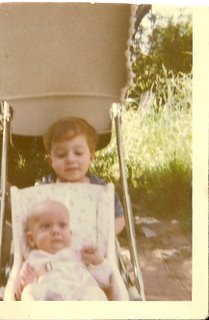 Once upon a long time ago, before Maya was born, and indeed not long after Maya's Mama and Dado were born, Granny was a young woman called Mom and she lived in Berkeley with Maya's Mama, who was called Julie, and Uncle Richard, who was just Richard. Now, when Julie was about six months old, so young that all she ate was baby food, Mom used to take Richard and Julie out to a restaurant every little once in a while. When they went to a restaurant, Mom would feed Julie baby food, and Mom and Richard would share a meal, because Richard was only two and a half years old, and so young that although he ate regular food, he didn't eat much of it.
Once upon a long time ago, before Maya was born, and indeed not long after Maya's Mama and Dado were born, Granny was a young woman called Mom and she lived in Berkeley with Maya's Mama, who was called Julie, and Uncle Richard, who was just Richard. Now, when Julie was about six months old, so young that all she ate was baby food, Mom used to take Richard and Julie out to a restaurant every little once in a while. When they went to a restaurant, Mom would feed Julie baby food, and Mom and Richard would share a meal, because Richard was only two and a half years old, and so young that although he ate regular food, he didn't eat much of it. Now, one of the places that Richard loved for Mom to take him was an Italian restaurant. The reason he loved to go there so much was that they had a most wonderful pizza, and they would make a little one just the right size for Mom and Richard to share. Oh, Richard loved that pizza! Well, one day Mom and Richard went to that Italian restaurant when Richard was very, very hungry. When the waitress brought the pizza, Richard wanted it right now! Well, as Maya knows very well, pizza in a restaurant comes to the table much hotter than pizza that is delivered or taken out. So, Richard reached for a piece of pizza, and Mom tried to stop him and said, "No! Hot! That's very hot!" But it was too late. He had already grabbed the pizza and put it in his mouth, hot cheese side first. "Aghhhhhhhhhh!" screamed Richard, because the hot pizza hurt! Oh, poor Richard. The roof of his mouth was blistered from the hot cheese. Oh, how he cried and cried. Oh, Mom comforted him, and the waitress brought ice to make his mouth feel better, and Julie cried because she knew Richard was hurt and that made her sympathetic. Finally, Richard calmed down, and stopped crying. But he didn't eat any pizza that day, not even when it got as cold as ice. No, indeed.
Now, one of the places that Richard loved for Mom to take him was an Italian restaurant. The reason he loved to go there so much was that they had a most wonderful pizza, and they would make a little one just the right size for Mom and Richard to share. Oh, Richard loved that pizza! Well, one day Mom and Richard went to that Italian restaurant when Richard was very, very hungry. When the waitress brought the pizza, Richard wanted it right now! Well, as Maya knows very well, pizza in a restaurant comes to the table much hotter than pizza that is delivered or taken out. So, Richard reached for a piece of pizza, and Mom tried to stop him and said, "No! Hot! That's very hot!" But it was too late. He had already grabbed the pizza and put it in his mouth, hot cheese side first. "Aghhhhhhhhhh!" screamed Richard, because the hot pizza hurt! Oh, poor Richard. The roof of his mouth was blistered from the hot cheese. Oh, how he cried and cried. Oh, Mom comforted him, and the waitress brought ice to make his mouth feel better, and Julie cried because she knew Richard was hurt and that made her sympathetic. Finally, Richard calmed down, and stopped crying. But he didn't eat any pizza that day, not even when it got as cold as ice. No, indeed. Indeed, Richard was so impressed with what the word hot meant, and how hot food could hurt you, that until he was four years old, he wouldn't drink hot chocolate. No, it had to be called warm chocolate. And he wouldn't eat hot cakes. They had to be pancakes. No hot dogs for him, only frankfurters! No hot pretzels, only warm ones.
Indeed, Richard was so impressed with what the word hot meant, and how hot food could hurt you, that until he was four years old, he wouldn't drink hot chocolate. No, it had to be called warm chocolate. And he wouldn't eat hot cakes. They had to be pancakes. No hot dogs for him, only frankfurters! No hot pretzels, only warm ones.
Sunday, October 29, 2006
Forry Gets the Ben of the Doubt
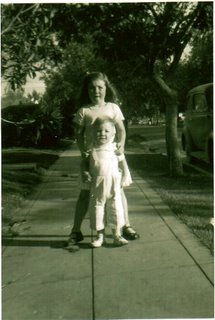 Maya has a great-uncle, named Uncle Forrest, who is Maya's Granny's brother. Today he is a very tall man, but once upon a time, when Granny was nine years old and still Joy (just a little too old to be Joy Baby any longer), Forrest was four and not so tall (although he had a full head of hair) and called Forry. Well, sometimes he was called Forry. Other times he was called For Ward, Boy, Boy. Because he was such a boy! He was daring and brave and always on the go. Quite a boy to love and be proud of, whether you were his parent or his sister!
Maya has a great-uncle, named Uncle Forrest, who is Maya's Granny's brother. Today he is a very tall man, but once upon a time, when Granny was nine years old and still Joy (just a little too old to be Joy Baby any longer), Forrest was four and not so tall (although he had a full head of hair) and called Forry. Well, sometimes he was called Forry. Other times he was called For Ward, Boy, Boy. Because he was such a boy! He was daring and brave and always on the go. Quite a boy to love and be proud of, whether you were his parent or his sister!At that time, Joy and Forry lived with their Little Mama and Daddy, for this was right after Little Mama had married Daddy, who took care of them all after their Papa died. So, there were the four of them, living out in the country near Stockton, and Little Mama and Forry and Joy were learning all about Daddy, and Daddy was learning all about them. There were still things they didn't know about each other, but they were all working at it.
One day Joy did something that Daddy thought she shouldn't have done. Granny would tell you what it was, but after all of these years (53!), she doesn't remember. And when Daddy mentioned it to her, and asked her what had happened, and she explained it to him, he said "It sounds to me like maybe you didn't realize that you aren't supposed to do that. This time I will give you the benefit of the doubt, but don't do it again." And Joy promised that she wouldn't, and that would have been that, except that Forry had been listening, and he (remember he was only four) wanted to have whatever Joy had, so he said, "Daddy, can I have some of that ben of the doubt too?"
 Then Daddy was well and truly puzzled, but only for a minute. Because, if there was one thing you could say about Daddy, it was that he had a feeling for young children, and he never wanted one to feel left out or cheated. For Daddy had been poor when he was a boy (at the last turn of the century) and so he knew what it was like to do without while others had things, and he knew that is especially hard for a child. So, he thought and thought, and he said, "Yes, indeed you can." And he went inside and brought out a bowl of potato chips for Joy and one for Forry. And they ate them all up, just like any child would do. And to this day, this is one of Granny's favorite stories, because of her brother wanting to be like her and have what she had, and her Daddy taking care that a little boy didn't get left out.
Then Daddy was well and truly puzzled, but only for a minute. Because, if there was one thing you could say about Daddy, it was that he had a feeling for young children, and he never wanted one to feel left out or cheated. For Daddy had been poor when he was a boy (at the last turn of the century) and so he knew what it was like to do without while others had things, and he knew that is especially hard for a child. So, he thought and thought, and he said, "Yes, indeed you can." And he went inside and brought out a bowl of potato chips for Joy and one for Forry. And they ate them all up, just like any child would do. And to this day, this is one of Granny's favorite stories, because of her brother wanting to be like her and have what she had, and her Daddy taking care that a little boy didn't get left out.
Saturday, October 28, 2006
Letting Down Our Kids
We're Letting Down Our Kids Over Tobacco and Alcohol
October 12, 2006
By Daniel K. Duncan
Editor's Note: This op-ed originally appeared on Sept. 14, 2006 in the St. Louis Post-Dispatch.
Is anyone paying attention to the news? Not the headlines about politics and war; I'm talking about some news stories that have to do with the well-being of our kids.
In the past few weeks, we've seen several stories -- seemingly unrelated -- that actually share a common thread. In late August, there was the story about how Big Tobacco secretly has been increasing the nicotine content of cigarettes since 1998, making its deadly product that much more lethal and addictive.
Lethal and addictive to whom? Kids, of course.
Children are a prime target of Big Tobacco, mainly because they have to be. If they can't hook kids to replace the smokers who are dying or quitting, the tobacco companies face serious economic consequences.
By increasing the addictiveness of its products, Big Tobacco again has shown its true colors -- despite lawsuits, settlements and promises of reform. Life and children be damned; profits reign supreme.
Another news story concerned itself with Big Tobacco's twin brother: Big Alcohol. A study out of Columbia University stated that 17.5 percent -- $22.5 billion -- of alcohol industry revenue is attributable to underage drinking.
This complemented an earlier article in the Journal of the American Medical Association that stated, "Half of all money spent on alcohol comes from the pockets of underage and adult excessive drinkers." The study concluded that "the industry has a compelling financial motive to attempt to maintain or increase rates of underage drinking." Sound familiar?
A few days after that, another story reported that the federal Centers for Disease Control and Prevention had denounced the alcohol industry for not abiding by its self-imposed ban on radio advertising to teens, a practice steadfastly denied by the industry.
As Big Tobacco did for decades, Big Alcohol is ready to present good news stats and "facts" that deny they market to youth and that advertising has nothing to do with why kids drink. Yet the industry is every bit as addicted to its profits as an alcoholic is addicted to alcohol. Indeed, it is trapped.
Could the industry afford to lose the kinds of profits that genuine social responsibility would bring? What would stockholders say?
It's not so hard to understand that the children of yesterday are the addicted smokers and problem drinkers of today, and that the children of today are the addicted smokers and problem drinkers of tomorrow. What is hard to understand is why we all are not working more diligently to protect our youth better, especially considering the targets on their foreheads?
Instead, our nation continues to subsidize tobacco growers, resist efforts to protect nonsmokers from toxic smoke and seemingly revel in an increasingly enmeshed social dependency on alcohol.
As a result, we continue to sacrifice to these monster industries our most precious commodity: our youth.
Does this make any sense at all? Doesn't this amount to offering up our own cultural integrity, common sense and intelligence to the chemicals of addiction?
It has been said a community can be judged by how it treats its youth. If we are not willing to better protect our youth from the predation of the tobacco and alcohol industries, perhaps we no longer deserve the privilege of calling ourself the greatest nation on earth.
Daniel K. Duncan is director of community services for the St. Louis chapter of the National Council on Alcoholism and Drug Abuse.
Reprinted with permission. All content copyright © 2004, St. Louis Post-Dispatch, L.L.C. All rights reserved.
Join Together publishes selected commentary relevant to alcohol
Friday, October 27, 2006
The Fight of Our Lives
 RIP Habeas Corpus
RIP Habeas CorpusWe need to recognize just how important this coming election is. It is not a contest for who gets to ride in Air Force One and invite his friends to stay in the Lincoln bedroom. It is the fight of our lives. Will there be any checks on Bush's destruction of the Constitution? Will anyone put the brakes on our slide toward dictatorship? Will anyone recognize that there are covert plans being implemented to attack Iran and stop them?
There is no getting rid of Bush for the next two years, unless we impeach both Bush and Cheney and have someone as Speaker of the House that we could trust in the Oval Office. The Supreme Court has already been loaded with two new judges who favor corporations, fundamentalist interpretations of the Constitution, and the rich. Our only hope is to wrest control of Congress out of the hands of the GOP.
One would think, what with the discontent with the war in Iraq, the ever growing list of GOP scandals that range from money laundering to allowing the sexual harassment of teen-aged pages, that the Dems would win hands down. Not so. First we have the Diebold voting machines, easily hacked and without a paper trail that may have already been used in 2004 to steal that election. Then we have the massive GOP campaign to disenfranchise huge numbers of voters who habitually vote for Democrats: purging of voter roles, laws to demand picture ID (which poorer voters may not have), posting of GOP "watchdogs" to frighten poor voters out of standing up for their rights, sending too few voting machines to Democratic percents. In 2002, the New Hampshire Democratic phone bank lines were jammed by GOP operatives so that voters who needed a ride to the polls were unable to call and request one. Fliers have been sent to Democratic districts informing them that the election was being held the day after it actually was. In 2004, in Ohio, voting machines registered votes for Bush when citizens had voted for Kerry. Poor voters in a number of places were told that election records could be used to trace people who hadn't paid traffic tickets or child support. In 2000, GOP congressional staff members were sent to Florida to intimidate the staff trying to recount the votes. People were removed from voting rolls in Florida whose name resembled the name of a convicted felon. Push poling in North Carolina in 2000 spread the rumor that John McCain had fathered an illegitimate mixed race child.
We can expect all of these tricks to be tried again. We need to watch and see what is happening in our own communities. And the Democratic Party needs to demand impartial monitoring in Florida and Ohio and all the other precincts for which there were questions in 2000, 2002, and 2004. We need to hold both parties accountable to do their part to ensure an honest election. That means, among other things, that we need to demand that the Dems don't concede early and allow the GOP to steal the prize, once again.
We need to be aware of the kinds of fear tactics that the GOP is liable to pull, to write letters to the editor when we see them being used, to talk to our friends who believe them. We need to arm ourselves with facts. We need to claim the moral high ground and stop allowing the GOP to steal it by default. When they claim to be the party of life, we need to remind people that life doesn't end when the abortion doesn't happen. That prenatal care and support for women and children are just as important. That invading a country that is no immediate threat is not supporting life. That sending an army of mostly brown and working class youth to fight without proper equipment is not supportive of life. That dropping depleted uranium cluster bombs on cities is not supportive of life. That emasculating environmental protections so that our water and food supply are contaminated is not supportive of life. That ignoring global warming is not supportive of life. That watching a city drown while you vacation is not supportive of life. That pressuring the EPA to announce that it was safe for rescue workers to go into Ground Zero while the air was still highly toxic is not supportive of life.
When they claim to be keeping us safe, when they tell us that because we are in Iraq there have been no attacks in the US since 2001, we need to remind them that there were no attacks in the US between the 1993 bombing of the World Trade Center and 9/11 and that was eight years and we had not needed to invade anyone to do that, it had not cost us over 3,000 US soldiers lives, over 45,000 US soldiers health, over 600,000 Iraqi citizens lives, and our grandchildren's prosperity to achieve it.
At Truthout.org, in the article Another Stolen Election Headed Our Way, By Andy Ostroy the author, in context of an interview with Mark Crispin Miller, outlines a five part plan to prevent the theft of this election.
Let us rally round the Constitution. Let us redeem all of the blood spilled for our freedom. Let us fight. Let us demand that our Democratic candidates fight. Let us raise our voices and if necessary, a stink.So, let's make this simple for voters:
1-Vote, vote, vote...and get everyone you know to vote as well
2-Write your congressmen and senators and demand uniformity and federal standards for the election process. Demand an end to electronic voting machines unless there's a viable paper trail. Demand paper ballots instead. Ask that election day be declared a national holiday
3-Bombard the media with letters and calls that demand coverage of election fraud
4-Organize demonstrations
5-Go armed to the polls next month with 1-866-OUR-VOTE and call it immediately to report any fraudulent and/or suspicious activity.In parting, the most chilling thing Mark told me was his prediction of what the Republicans will do should Democrats win on Nov 7th, which he also expounded in American Spectator: "If the GOP should lose the House or Senate, its troops will mount a noisy propaganda drive accusing their opponents of election fraud. This is no mere speculation, according to a well-placed party operative who lately told talk radio host Thom Hartmann, off the record, that the game will be to shriek indignantly that those dark-hearted Democrats have fixed the race. We will hear endlessly of Democratic "voter fraud" through phantom ballots, rigged machines, intimidation tactics, and all the other tricks whereby the Bush regime has come to power. The regime will, in short, deploy the ultimate Swift Boat maneuver to turn around as many races as they need so as to nullify the will of the electorate."
Thursday, October 26, 2006
The Doll Buggy
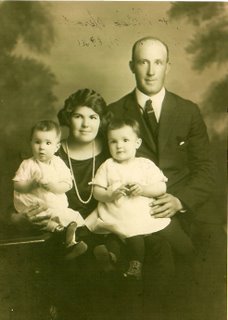 Now, Maya will remember that her Granny's Little Mama was once a little girl named Virginia, and called Ginny. But, what Maya may not yet realize, is that not only was Granny's Little Mama a little girl, but also her Aunt Flo was once a little girl. Now, Flo is Ginny's sister, just 16 months younger than Ginny, and they have always been the very best of friends. When Flo and Ginny were little, they played with each other. And when they were teenagers, they shared secrets. And when Ginny eloped and got married, Flo was the only one she told. Even, when Ginny had a baby called Joy (yes, indeed, the very same Joy who grew up to be Maya's very own Granny) she had her on Flo's 18th birthday! Now that they are little old ladies, they live together. So, Maya can see that Ginny and Flo have always been the very best of friends.
Now, Maya will remember that her Granny's Little Mama was once a little girl named Virginia, and called Ginny. But, what Maya may not yet realize, is that not only was Granny's Little Mama a little girl, but also her Aunt Flo was once a little girl. Now, Flo is Ginny's sister, just 16 months younger than Ginny, and they have always been the very best of friends. When Flo and Ginny were little, they played with each other. And when they were teenagers, they shared secrets. And when Ginny eloped and got married, Flo was the only one she told. Even, when Ginny had a baby called Joy (yes, indeed, the very same Joy who grew up to be Maya's very own Granny) she had her on Flo's 18th birthday! Now that they are little old ladies, they live together. So, Maya can see that Ginny and Flo have always been the very best of friends.Well, when Ginny and Flo were very young they made friends with two little girls who lived close to their house, the Real twins, Eileen and Kathleen (who is called Kay). The four little girls, two sets of sisters, would get together and play almost every day. They liked each other a lot and did lots and lots of things together.
 So, when Ginny was about 4 and Flo was about 3, it happened that they were given doll buggies. Oh how they liked those doll buggies! They put their dolls in the buggies, and they walked up and down, up and down, taking their dollies for a walk. Pretty soon they decided to go visit the Real twins, and so they took their doll buggies with them. Then they took turns, letting Kay and Eileen push the dollies in the buggies. Up and down. Up and down. Oh, those four little girls had such a lot of fun with their dollies. And then, Ginny got to thinking about how sad it was that Kay and Eileen didn't have doll buggies of their own. She felt so sorry for them, she worried and worried about it. Finally, she figured out a solution -- she gave them Flo's doll buggy!
So, when Ginny was about 4 and Flo was about 3, it happened that they were given doll buggies. Oh how they liked those doll buggies! They put their dolls in the buggies, and they walked up and down, up and down, taking their dollies for a walk. Pretty soon they decided to go visit the Real twins, and so they took their doll buggies with them. Then they took turns, letting Kay and Eileen push the dollies in the buggies. Up and down. Up and down. Oh, those four little girls had such a lot of fun with their dollies. And then, Ginny got to thinking about how sad it was that Kay and Eileen didn't have doll buggies of their own. She felt so sorry for them, she worried and worried about it. Finally, she figured out a solution -- she gave them Flo's doll buggy!That night, Ginny and Flo's Papa, Granny's Grandpa Percy, asked them where Flo's doll buggy was. Ginny explained about poor Kay and Eileen not having doll buggies, and how that was not fair, and how she had solved the problem by giving them Flo's. Her Papa said, "Ginny, you can't give away other people's toys. You and I have to go down and get Flo's buggy back." But, when Ginny and her Papa got to the Real's house, what do you think they discovered? Oh, dear, a tragedy had occurred. Mr. Real (Kay & Eileen's Papa) hadn't known that there was a doll buggy anywhere around, and so he hadn't looked out for it when he backed the car out of the garage. He had backed the car right over it and crushed it flat!
Well, Ginny was very sorry for Flo, but she couldn't get her doll buggy back, because it was ruined. But, her Papa explained, that since she had given it away, she would have to give Flo her doll buggy to make it right. Oh, poor Ginny! No doll buggy! How sad she was! But, the thing about it is that she never forgot it. No, indeed. When Granny was a little girl named Joy Baby and Ginny was her Little Mama, she told Joy Baby all about it. And she never again in her whole life gave away something that belonged to someone else. No, she did not.
Wednesday, October 25, 2006
Big Black Birds
That same year the crows on 7th street, a block from my place, were so territorial that they dive bombed pedestrians to drive them away from their nests. They also tried to get people to drop their grocery bags so that they could raid them. It was very annoying, and so a plaster owl was mounted to frighten the crows away. (Apparently they do scare woodpeckers.) Instead, the crows spent hours surrounding and scolding it.
 Acting sensibly, I have no doubt,
Acting sensibly, I have no doubt,Father Gorgeous set the garbage out.
But two cans have somehow lost their lids.
And Raven, like some vandal kids,
Is tossing all the trash around,
Devouring all the scraps he's found.
 Crows, dive bombing from the trees,
Crows, dive bombing from the trees,Command 7th Street with ease.
Some neighbors have installed an owl,
A plaster one upon a dowel.
So now they roost above the walk,
And teach it, patiently, to talk.
Tuesday, October 24, 2006
You Get What You Pay For
 In the mid-70s I indulged myself by having my colors done at Personal Style Counselors, in Oakland, California. It was one of the places where I chose to spend the required money ($200 if my memory serves--not a small amount for a single mother working in non-profits to save) to do it right and have never regretted it. All the color analysts were graduates of four-year programs in the fine arts and then received substantial training from the firm. My analyst spent over an hour with me, under a skylight, matching color swatches to my hair, skin, teeth, eyes, and the whites of my eyes. I ended up with a full palette of colors, representing shades I could wear of all of the major colors. (I can't wear pure white well, but there are several off-whites that are dynamite on me, for instance.) Then, I took a series of classes in what all of this meant as far as design was concerned. How to wear neutrals, how to mix dynamic colors and not overdo it, how to build a wardrobe that, over time, totally supported me looking my best. It has been about 30 years now, and there are no colors in my closet that can't be worn with any other colors in my closet (except the "not-my-color" orange tee shirt with the sandhill crane given me by someone who knew I love sandhill cranes). I don't wear cotton tee shirts with my silk floor length skirt, but the colors would go if I did.
In the mid-70s I indulged myself by having my colors done at Personal Style Counselors, in Oakland, California. It was one of the places where I chose to spend the required money ($200 if my memory serves--not a small amount for a single mother working in non-profits to save) to do it right and have never regretted it. All the color analysts were graduates of four-year programs in the fine arts and then received substantial training from the firm. My analyst spent over an hour with me, under a skylight, matching color swatches to my hair, skin, teeth, eyes, and the whites of my eyes. I ended up with a full palette of colors, representing shades I could wear of all of the major colors. (I can't wear pure white well, but there are several off-whites that are dynamite on me, for instance.) Then, I took a series of classes in what all of this meant as far as design was concerned. How to wear neutrals, how to mix dynamic colors and not overdo it, how to build a wardrobe that, over time, totally supported me looking my best. It has been about 30 years now, and there are no colors in my closet that can't be worn with any other colors in my closet (except the "not-my-color" orange tee shirt with the sandhill crane given me by someone who knew I love sandhill cranes). I don't wear cotton tee shirts with my silk floor length skirt, but the colors would go if I did.At that time, having your colors done was a real fad. You could have them done at a party, where you would be given a prepared collection of colors to wear. This cost, at that time, about $35. The "analysts" had received about two hours of training and hadn't a clue what they were doing.
The thing here was that you get what you pay for. I, mostly out of dumb luck, first heard of color analysis from a friend who had gone to Personal Style Counselors, and so that was the standard by which I was judging other possibilities when I looked at where to go. I ended up with information that I will use for the rest of my life, because it was correctly done. Very few of the women I knew could say that. They went looking for bargains, and so they were cheated.
Probably the "analysts" who they consulted didn't mean to cheat them. Probably the "analysts" who they consulted actually thought that what they were doing was color analysis and that they were trained professionals. How someone could believe that you could become trained as any kind of a consultant in less time than McDonald's spends training their staff, I do not know. But there is a great deal of it in the world.
The push for instant answers and instant expertise is great. The concept that proficiency comes from knowledge and practice and effort seems foreign. I got to thinking about this today after visiting Ronni at As Time Goes By where Crabby Old Lady is writing about Elder Life Coaches, many of whom may have been doing $35 color analysis in the 70s. Flimflam, Crabby calls it; flimflam, Maya's Granny agrees.
Expertise requires effort. It requires education. It requires thinking about. It requires asking questions of someone who knows the answers or at least knows how to look for the answers. It requires time. It requires experience in the field with professional guidance. You don't get it from a how-to book or a computer coarse.
Even a degree will not give it to you. I had two children, in two sets of circumstances. Richard was born in the county hospital, delivered by an intern. When I told him that this baby would come fast, that the women in my family for five generations back had never gone over four hours of labor and seldom more than two, he told me that they had lied to me to keep me calm. "This," he said from the glory of his degree, "is a first birth. You will go about 36 hours." Less than two hours after the first pain, that man had to drop his coffee cup and catch Richard. Two years later, I had Julie. This time I had an ob-gyn who was in his 60s. He took one look at me when I walked into his office and said, "Good wide pelvis. Your first birth took about two hours?" That is the difference between education and experience.
 The neighbor who buys a how-to book on cabinetry and turns out a wonderful set of cabinets was not an amateur when she started! She already knew a tape measure from a jigsaw and how to use both. She had already built bird houses and book shelves and other well crafted items. The parent who learns from parenting books already has some experience with children and some other, more experienced parents to consult when her understanding of the book leads her astray.
The neighbor who buys a how-to book on cabinetry and turns out a wonderful set of cabinets was not an amateur when she started! She already knew a tape measure from a jigsaw and how to use both. She had already built bird houses and book shelves and other well crafted items. The parent who learns from parenting books already has some experience with children and some other, more experienced parents to consult when her understanding of the book leads her astray.There are no instant experts. There is no easy way to competence and knowledge. No pills. No sleep learning. No affirmations. Just slogging hard work. And until I have put that in, I'm not an expert. It's why grandfathers are wise, why old wives tell tales that matter.
Follow-up, Again Protection
Random Drug Testing Would Meet Fierce Opposition
October 23, 2006
Email Print Subscribe
Dear Editor,
Roger Morgan's proposal for state governments to mandate random, suspicionless drug testing in all middle and high schools would meet fierce opposition in his home state of California (October 19, 2006, "Drug Czar's Leadership, Testing Would Save Money, Improve Anti-Drug Fight"). In 2004 the million member California State Parent Teachers Association supported a proposed ban on random, suspicionless student drug testing because the programs break down relationships of trust between students and adults, damaging an essential characteristic of a safe and rewarding learning environment, and hindering open communication.
While Morgan asserts -- without supporting evidence -- that random drug testing has a proven history of success, the best available research does not support the use of student drug testing programs. The largest study conducted on the topic compared 94,000 students in 900 American schools with and without drug testing programs, and found no difference in illegal drug use. Morgan promises billions of dollars in state savings, but the plan would simply waste millions of taxpayer dollars on a counterproductive, ineffective and costly program. Young people deserve more.
Jennifer Kern
Research Associate
Drug Policy Alliance - Office of Legal Affairs
819 Bancroft Way
Berkeley, CA 94710
(510) 229-5211
Monday, October 23, 2006
Richard & The Beautiful Thing
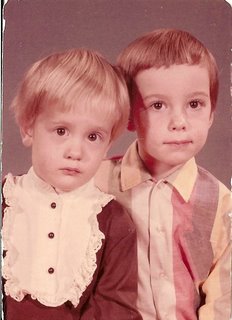 Once upon a it- seems- like- no- time- at- all- to- Granny time ago, when Maya's Mama was a little girl named Julie, and Maya's Uncle Richard was a little boy named Richard, and Maya's Granny was a young woman called Mom, and they hadn't a single wrinkle between them, they all lived together in a number of places, because they moved around a lot. But this story happened when none of them had ever been to Alaska, after they left Berkeley, and before they moved to Redwood City, when they lived in Stockton the first time. And Richard was 4½, and Julie was 2½, and Mom was 26. Yes they were, even if Maya doesn't think they were ever that young, indeed they were.
Once upon a it- seems- like- no- time- at- all- to- Granny time ago, when Maya's Mama was a little girl named Julie, and Maya's Uncle Richard was a little boy named Richard, and Maya's Granny was a young woman called Mom, and they hadn't a single wrinkle between them, they all lived together in a number of places, because they moved around a lot. But this story happened when none of them had ever been to Alaska, after they left Berkeley, and before they moved to Redwood City, when they lived in Stockton the first time. And Richard was 4½, and Julie was 2½, and Mom was 26. Yes they were, even if Maya doesn't think they were ever that young, indeed they were.Now, as it happens, Richard and Julie always went shopping with Mom, just like Maya goes shopping with her Mama today. And, indeed, the story I am telling you started in Safeway, although it was not the same Safeway where Maya and her Mama go. For one thing, it was in Stockton and not Walnut Creek, and for another they never gave away balloons and cookies to the children in those not-so-terribly-long-ago days, which they do now.
Well, one day Mom had taken Julie and Richard to Safeway with her, and she had Julie in the cart, because Julie was still pretty young, and Richard was walking along, because Richard was older. Mom was in the produce section, where all of the wonderful fruit and vegetables are, and she was trying to decide if she should buy some asparagus, or if maybe one of Aunt Flo's friends would be giving her (Aunt Flo, that is) some (which, of course, she always shared) this week. If Aunt Flo's friend was giving her asparagus, then it would be a waste for Mom to buy it also, but if he didn't, then Julie and Richard and Mom would do without, and so Mom had to think about this carefully. While she was discussing this with Julie, Richard pulled on her skirt (in those days Mom wore skirts all the time, because those were the olden days, even if they weren't all that long ago).
 Mom looked down, and Richard pointed to a magnificent, deep purple eggplant, and said "Mom, please buy me this beautiful thing". The expression on his face was rapt, and his voice was amazed. Now, Mom always wanted her children to eat their vegetables (which they always did, because they loved them so), and she remembered that when she had been a little girl called Joy Baby her Grandmother Herndon used to send her out to Grandfather Herndon's garden with a little basket to choose her own vegetables for dinner, and those vegetables always tasted the very best. So, Mom had Richard help her choose just which eggplant he wanted, and she put it in her cart, and when they got to the check-out stand she paid for it and then they took it home.
Mom looked down, and Richard pointed to a magnificent, deep purple eggplant, and said "Mom, please buy me this beautiful thing". The expression on his face was rapt, and his voice was amazed. Now, Mom always wanted her children to eat their vegetables (which they always did, because they loved them so), and she remembered that when she had been a little girl called Joy Baby her Grandmother Herndon used to send her out to Grandfather Herndon's garden with a little basket to choose her own vegetables for dinner, and those vegetables always tasted the very best. So, Mom had Richard help her choose just which eggplant he wanted, and she put it in her cart, and when they got to the check-out stand she paid for it and then they took it home.Well, let me tell you, Mom was excited that Richard had chosen a new vegetable for dinner! And Richard was excited that Mom had bought him his beautiful thing. The only trouble at all was that Mom had never cooked eggplant. But that wasn't a very big trouble, because Mom's Grandmother Herndon had often cooked it. So, Mom called her Grandmother and her Grandmother (who was Richard and Julie's great-grandmother) told her exactly how to cook the eggplant. So, Mom sliced the eggplant, and dipped it in milk, and rolled it in cracker crumbs, and fried it in the pan and served it with dinner. Oh, how lovely! And Richard and Julie sat down at the table, and Richard took one bite of the eggplant, and Mom was waiting for him to say how good it was, and he said, "I hate this stuff!"
How disappointing! After liking how it looked, and buying it, and Mom cooking it, it turned out that eggplant was one vegetable that Richard didn't like! Well, so it goes. So, Mom and Julie ate the eggplant between them, and Richard (having tried it, after all) had a sliced tomato, and that was that.
Until the next time they went to Safeway! There they were, Julie in the cart, Richard walking along, Mom choosing some ripe ears of corn, and Richard came up to Mom and pulled on her skirt (it's a wonder it stayed on, the way those children pulled on it to get Mom's attention, because Julie did it, too, you know --— just not when she was in the cart) and pointed to the eggplants, and said "Mom, please buy me that beautiful thing!" Now, Mom already knew that Richard didn't like eggplant, even if he didn't remember, so she said, "Remember the last time we bought an eggplant? Remember that you didn't like the way it tastes?" But that didn't matter, Richard still said, "Please." So, Mom thought, well we can give it one more try, and so she bought it. And took it home.
This time, when Mom cooked the eggplant, she had Richard stand right beside her and watch, so that he would know that the vegetable on the table was the eggplant he had wanted. She let him dip the slices in the milk and roll them in the cracker crumbs. She let him watch her fry it in the pan. And when she put it on his plate and he took a bite, he said, "I hate this stuff!"
Well, if he did, he did, and that didn't surprise Mom, because it was still the same stuff, and the taste wouldn't have changed. Mom figured that now he knew that the beautiful thing he saw in the store was that stuff he hated on the plate, and that would be that. How wrong could she be?
The very next time they went to the store, there they were in the produce department, Julie in the cart, Richard walking around, Mom choosing a nice bunch of broccoli for dinner, and Richard pulled on her skirt, and pointed to the eggplant, and said (oh, yes, indeed, he did), "Please, Mom, buy me this beautiful thing." And Mom finally understood! Richard didn't want to eat that stuff. He wanted to have the beautiful thing. So, this time when Mom bought the eggplant and took it home, she didn't slice it and dip it and roll it and fry it. No, indeed not. This time she found a lovely basket to put it in, and she found a soft cloth to put with it, and she put it on the toy shelf in Richard and Julie's room. And Richard polished it with the cloth every day for as long as it lasted. It shone with the loving care he gave it, and indeed it was a beautiful thing.
And yesterday Maya's Mama posted a recipe for eggplant on her blog and reminded Maya's Granny of this story.
Sunday, October 22, 2006
The Road That Was Taken
Granny wrote an e-mail to Michael, who is now Maya's Gramps, to tell him about it and she wrote a letter to Robert telling him how sorry she was. Then Granny realized that she had to write to Jane as well, because Jane was David's mother. And Granny hadn't seen or heard from Jane since Jane and Robert got their divorce and that was 38 years ago, Granny remembers because it was right after Uncle Richard was born.
Well, Granny wrote a letter to Jane and she was very sad about David all over again. But then, Granny realized that she was sad about something else as well, and what that other thing was, she was sad that it had been so long since she had seen or talked to Jane. That Granny really missed Jane. And she missed her even more when the letter came back and Granny realized that she didn't know where Jane was.
 And then Granny got to thinking about all the moving she had done in her life, and all of the friends that she had lost touch with, and it seemed to her that her past was like a landscape littered with lost friends. Little girls that she had known when she was a little girl, like Lupe and Maria, Jean and Rita Pine, Sandy Pettichord, Roberta and Bernadette, and Esther. Teenaged girls that she had known when she was a teenaged girl, like Ruth, Sarah, and Jenny, Jane, and Katy Savage. Young women that she had known when she was a young woman, like Gail Jennings, Nanette, Julie Anne, and Val, Kit Schneider, Rita, Nicola, and Leanne. Full grown women that she had known when she was a full grown woman, like Jean Van Whye and Gloria Desroucher and Alison Hudson and Carol Pevin and Zenia Tata. And Granny really missed them all. Granny thought about the friends she still has from her earlier days, and they are few. Like Linda Lapsley and Linda McKinney. And even they don't live in Juneau near Granny. Granny wished that she could have always lived in one town and always had the same friends and know where they all are and see them all the time.
And then Granny got to thinking about all the moving she had done in her life, and all of the friends that she had lost touch with, and it seemed to her that her past was like a landscape littered with lost friends. Little girls that she had known when she was a little girl, like Lupe and Maria, Jean and Rita Pine, Sandy Pettichord, Roberta and Bernadette, and Esther. Teenaged girls that she had known when she was a teenaged girl, like Ruth, Sarah, and Jenny, Jane, and Katy Savage. Young women that she had known when she was a young woman, like Gail Jennings, Nanette, Julie Anne, and Val, Kit Schneider, Rita, Nicola, and Leanne. Full grown women that she had known when she was a full grown woman, like Jean Van Whye and Gloria Desroucher and Alison Hudson and Carol Pevin and Zenia Tata. And Granny really missed them all. Granny thought about the friends she still has from her earlier days, and they are few. Like Linda Lapsley and Linda McKinney. And even they don't live in Juneau near Granny. Granny wished that she could have always lived in one town and always had the same friends and know where they all are and see them all the time.(Since that day, five years ago, Julie has found Kate for Granny and Michael has found Jane for Granny, and now Granny sees them both when she goes to California and e-mails them and talks to them on the phone. She still doesn't know where her other friends are, and sometimes she still misses them. Sometimes she envies people who stay in one place and have the same friends always.)
And Granny realized that when you choose to wear your blue shirt, your closet is full of shirts you aren't wearing, and when you choose to eat sourdough bread and Limburger cheese the kitchen is full of food you aren't eating, and when you choose to move to a new place, the world is full of places and people you have left behind. And Granny realized that when you are born under a wandering star, sometimes you long for roots.
Saturday, October 21, 2006
And, Again Protection
Mandated Drug Testing
Non-punitive random drug testing is the best tool we have to prevent substance use and abuse and get kids to adulthood intact, where science says they should never have a problem with drugs. Almost all addiction starts with kids, so if the answer to cutting the level of substance abuse is to protect the kids. If we protect the kids, we will protect the nation.*** Even if politically sensitive, the results from universal, non-punitive random drug testing for all students would be so astounding in terms of saved lives, dollars and creation of productive young people that in short order all parents and taxpayers would demand this protection.
 One more intrusion of unconstitutional search and seizure, this time with the excuse that it is protection that parents would demand. Like a car seat, perhaps. Let me take away your child's rights and I can protect the nation. Yes, indeed.
One more intrusion of unconstitutional search and seizure, this time with the excuse that it is protection that parents would demand. Like a car seat, perhaps. Let me take away your child's rights and I can protect the nation. Yes, indeed. I flew back to Alaska from California a few years ago seated next to a man who represents a drug testing firm. He was telling me that each test developed results in people developing ways to get around it, which leads to development of further tests which leads to . . . Reminded me of the Morton Salt girl. An infinite regression that leads to profit for the drug testing firms and surely, surely "When it (testing) rains, it (money) pours." (And, when I mentioned this article to my office mate, who also works in underage abuse prevention, her immediate response was, "Sounds like he owns some drug testing stock." Doesn't it just?)
I flew back to Alaska from California a few years ago seated next to a man who represents a drug testing firm. He was telling me that each test developed results in people developing ways to get around it, which leads to development of further tests which leads to . . . Reminded me of the Morton Salt girl. An infinite regression that leads to profit for the drug testing firms and surely, surely "When it (testing) rains, it (money) pours." (And, when I mentioned this article to my office mate, who also works in underage abuse prevention, her immediate response was, "Sounds like he owns some drug testing stock." Doesn't it just?)I knew then that this one industry alone had too much of a stake in drugs being illegal to allow anything like a rational discussion of legalizing if they could prevent it. Multiply that by the prison guards and staff, the firms building prisons, the stores selling the products that cheat the test (I was told by several teens that you just have to ask the clerks at one national chain and they will steer you right to it), the lawyers prosecuting and defending drug users and you have a lot of people with a financial interest in drugs being illegal. Personally, I'm just enough of a cynic to believe that drug cartels make campaign contributions to politicians who fight the drug war.
The other thing, of course, is that this is not the only industry that is growing rich off of convincing parents that their children need to be treated like criminals. (Actually, I wouldn't treat many criminals like that.) There are so-called mental health facilities that market heavily to the parents of teens, who they then abuse horribly. When one state closes them down (and even Texas has closed some of the worse ones down) they pack up stakes and move to another. Same corporation. Same management. Often, same staff. At times staff you wouldn't hire to clean your toilets, staff who can't pass criminal background tests.
They say to follow the money. And it's easy to do -- just follow the yellow brick road.
Friday, October 20, 2006
Friday Cat Blogging
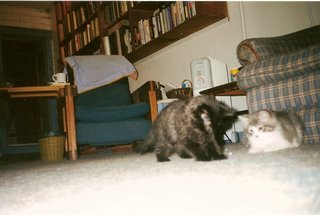 Merry and Pippin are best friends, and have been since they were small kittens. Here they are exploring the wonderful world of bubbles. Every cat owner should have bubble soap -- watching them bat the bubble and see it disappear is delightful. Once they have become blase about that, blowing the bubble full of smoke is a new variation. When they hit the bubble, the smoke hangs in the air for a few seconds, which they are not expecting. I haven't done that with a cat in over 30 years, since I stopped smoking.
Merry and Pippin are best friends, and have been since they were small kittens. Here they are exploring the wonderful world of bubbles. Every cat owner should have bubble soap -- watching them bat the bubble and see it disappear is delightful. Once they have become blase about that, blowing the bubble full of smoke is a new variation. When they hit the bubble, the smoke hangs in the air for a few seconds, which they are not expecting. I haven't done that with a cat in over 30 years, since I stopped smoking.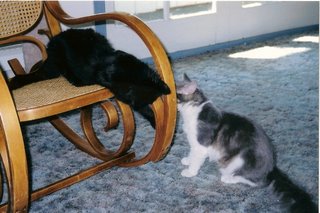 They also loved the rocking chair when they were small. These days they are so big that it isn't as much fun, but in the early days they climbed the back and batted each other through the bentwood and peaked at each other through the caning.
They also loved the rocking chair when they were small. These days they are so big that it isn't as much fun, but in the early days they climbed the back and batted each other through the bentwood and peaked at each other through the caning.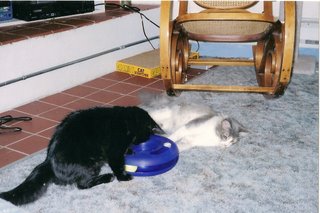 This wonderful blue ring was a gift to the Hooligans from Maya. It provides hours of entertainment. When they stop playing with it, I put it away for a few months and then when it comes out again it is, once again, novel. They don't forget it, but they do become interested in it again.
This wonderful blue ring was a gift to the Hooligans from Maya. It provides hours of entertainment. When they stop playing with it, I put it away for a few months and then when it comes out again it is, once again, novel. They don't forget it, but they do become interested in it again.
In this picture the laser light is crossing the ceiling. Merry is tracking it, Pippin has lost sight of it and is searching for it. The light on the wall is a night light, which my apartment is full of due to the long, dark, winter nights.
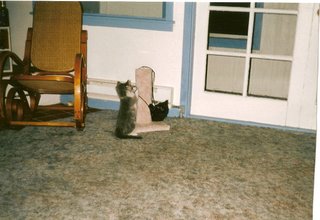 Here they are playing with a shoe string that Merry has carried to the top of the scratching post. All of these pictures were taken before the Kitty Condo was purchased.
Here they are playing with a shoe string that Merry has carried to the top of the scratching post. All of these pictures were taken before the Kitty Condo was purchased. And here they have pulled the shoestring down to the bottom of the scratching post. Soon Merry carried it back up again, and the play started all over.
And here they have pulled the shoestring down to the bottom of the scratching post. Soon Merry carried it back up again, and the play started all over.Needless to say, these two always sleep soundly.
Thursday, October 19, 2006
Welcome Arches
 Modesto, where I graduated from high school, is one of the central valley California towns that used to be agricultural and are now bedroom communities for the San Francisco bay area. Like many cities in California, Modesto has an arch over what was once the main road into town with the town motto on it. "Water Wealth Contentment Health" it reads. But, that was actually the second place entry in the 1911 contest which was originally won by "Nobody's Got Modesto's Goat".
Modesto, where I graduated from high school, is one of the central valley California towns that used to be agricultural and are now bedroom communities for the San Francisco bay area. Like many cities in California, Modesto has an arch over what was once the main road into town with the town motto on it. "Water Wealth Contentment Health" it reads. But, that was actually the second place entry in the 1911 contest which was originally won by "Nobody's Got Modesto's Goat". Redwood City, where I lived while attending the College of Notre Dame for my Montessori credential, has one that reads "Climate Best by Government Test" which always caused me to wonder what level of government, when, and what the criteria were. I'm certain that the Redwood City Assembly would have been more favorable in this judging than the U. S. Congress. Although, during the time I lived there, Redwood City did, indeed, have a very pleasant climate.
Redwood City, where I lived while attending the College of Notre Dame for my Montessori credential, has one that reads "Climate Best by Government Test" which always caused me to wonder what level of government, when, and what the criteria were. I'm certain that the Redwood City Assembly would have been more favorable in this judging than the U. S. Congress. Although, during the time I lived there, Redwood City did, indeed, have a very pleasant climate. Some welcome arches, like this, simply announce the name of the town. Apparently the good citizens of Weed feel that is sufficient for anyone to know. Here we are, it seems to say, needing no claims or embellishments. Although, why would anyone name a town Weed, do you suppose?
Some welcome arches, like this, simply announce the name of the town. Apparently the good citizens of Weed feel that is sufficient for anyone to know. Here we are, it seems to say, needing no claims or embellishments. Although, why would anyone name a town Weed, do you suppose?In my misspent youth, I used to wonder if one could score marijuana in Weed, which would make a certain amount of sense.
 Many, like this one in Fairfield, give you a little more information concerning the status of the community. This is an important town, one imagines, with a courthouse and county offices -- perhaps its own weighing station on the freeway, as other county seats I've known in California have.
Many, like this one in Fairfield, give you a little more information concerning the status of the community. This is an important town, one imagines, with a courthouse and county offices -- perhaps its own weighing station on the freeway, as other county seats I've known in California have. Or its proximity to some place of greater fame. To be the gateway to an entire mountain range is a proud thing. What more could a city wish? Or, what else does Clovis have? It is enough. It declares an identity that the community is proud of, it welcomes visitors, it fulfils its function. Apparently there was a great fad for welcome arches, as they are called, during the beginning of the 20th century. They vary in many ways, going from this rather stark example that isn't really an arch at all,
Or its proximity to some place of greater fame. To be the gateway to an entire mountain range is a proud thing. What more could a city wish? Or, what else does Clovis have? It is enough. It declares an identity that the community is proud of, it welcomes visitors, it fulfils its function. Apparently there was a great fad for welcome arches, as they are called, during the beginning of the 20th century. They vary in many ways, going from this rather stark example that isn't really an arch at all, to the Lodi arch, which is stucco with Spanish tile over the pedestrian gates. After this arch was built, with mission bells in it, the California bear was placed on the top. Very clearly, this arch belongs in California, although so far as I know there were never any Spanish missions in Lodi. It is more of a German community. Lodi, like Weed, feels a need for no embellishments. It is what it is. Here it is being refurbished.
to the Lodi arch, which is stucco with Spanish tile over the pedestrian gates. After this arch was built, with mission bells in it, the California bear was placed on the top. Very clearly, this arch belongs in California, although so far as I know there were never any Spanish missions in Lodi. It is more of a German community. Lodi, like Weed, feels a need for no embellishments. It is what it is. Here it is being refurbished.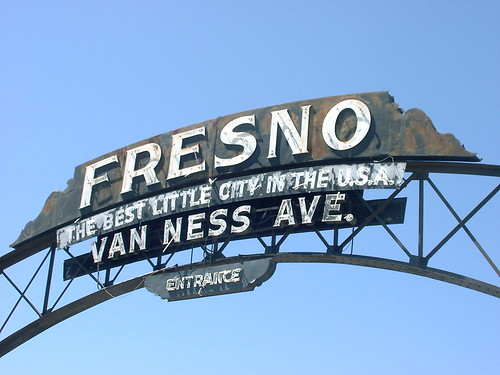 Many are still in a central part of town, but many are like the Fresno arch, which has been left behind and is now in the warehouse district. Fresno, you will notice, claims to be the "Best Little Town in the USA". Again, I have to wonder how that was determined? I know that it is a part of the Central Valley of California, some of the richest agricultural land in the world. They grow raisins in Fresno. In the 60s it, like Modesto, was a place that people wanted to get away from. Too countrified.
Many are still in a central part of town, but many are like the Fresno arch, which has been left behind and is now in the warehouse district. Fresno, you will notice, claims to be the "Best Little Town in the USA". Again, I have to wonder how that was determined? I know that it is a part of the Central Valley of California, some of the richest agricultural land in the world. They grow raisins in Fresno. In the 60s it, like Modesto, was a place that people wanted to get away from. Too countrified. They aren't restricted to California. Las Vegas has one, Denver has one, even Ketchikan has one, as you can see from this photo identifying the city as both the salmon capital of the world and Alaska's 1st City (by which they mean, the town furthest south). They were the rage. Communities considered the face that they wanted to present to the world and built an arch to immortalize it. And then, they went out of style and you don't see many new ones anymore.
They aren't restricted to California. Las Vegas has one, Denver has one, even Ketchikan has one, as you can see from this photo identifying the city as both the salmon capital of the world and Alaska's 1st City (by which they mean, the town furthest south). They were the rage. Communities considered the face that they wanted to present to the world and built an arch to immortalize it. And then, they went out of style and you don't see many new ones anymore. Cherry commented that there is a new arch in Pleasant Hill, which she can't find a picture of and neither can I. However, here is a picture of the Pleasanton arch. The Wikipedia photo shows a banner beneath the arch, but whether there is a motto on it or not I can't tell. However, the town has been known in the past as "The Most Desperate Town in The West," which I don't imagine is on the arch and really wish was.
Cherry commented that there is a new arch in Pleasant Hill, which she can't find a picture of and neither can I. However, here is a picture of the Pleasanton arch. The Wikipedia photo shows a banner beneath the arch, but whether there is a motto on it or not I can't tell. However, the town has been known in the past as "The Most Desperate Town in The West," which I don't imagine is on the arch and really wish was. As long as I'm adding this one, you might as well see the burl arch in Nome, Alaska which is the furthest north welcome arch in the U.S. The arch reads "End of the Iditarod Dog Race" rather than the town motto, "There's No Place Like Nome." One is kind of sorry about that.
As long as I'm adding this one, you might as well see the burl arch in Nome, Alaska which is the furthest north welcome arch in the U.S. The arch reads "End of the Iditarod Dog Race" rather than the town motto, "There's No Place Like Nome." One is kind of sorry about that.
Wednesday, October 18, 2006
The Water We Swim In
 In the late 80s, Julie had gone off to San Francisco and Richard and I were living together in Stockton. We had two tanks of fish -- one 20 gallon tank of mixed tropicals and one 35 gallon with two massive goldfish. I had been lazy and let the big tank go a little too long (they were my fish, and so my job to clean the tank), when I had to go to Southern California to do a training. Since I was going to be gone for a week, I asked Richard to take care of the fish tank before I got back.
In the late 80s, Julie had gone off to San Francisco and Richard and I were living together in Stockton. We had two tanks of fish -- one 20 gallon tank of mixed tropicals and one 35 gallon with two massive goldfish. I had been lazy and let the big tank go a little too long (they were my fish, and so my job to clean the tank), when I had to go to Southern California to do a training. Since I was going to be gone for a week, I asked Richard to take care of the fish tank before I got back.When I returned, I opened the front door and the first thing I saw was the still dirty tank, with two fish floating on the top. Knowing that the thought of my dead pets was going to bother me until I dealt with it, I put my suitcase down, got the net, removed the first fish, and dumped it into the toilet. Just as I reached to flush, the fish revived and started swimming strongly. So, I put him in a pot of water, added his bowl mate, and cleaned the tank.
What made me think of this today was this entry over on Echidne of the Snakes.
Finally the M-word has been pronounced in the mainstream media. Finally. Here is Bob Herbert on the school massacres and their real nature:
In the widespread coverage that followed these crimes, very little was made of the fact that only girls were targeted. Imagine if a gunman had gone into a school, separated the kids up on the basis of race or religion, and then shot only the black kids. Or only the white kids. Or only the Jews.
There would have been thunderous outrage. The country would have first recoiled in horror, and then mobilized in an effort to eradicate that kind of murderous bigotry. There would have been calls for action and reflection. And the attack would have been seen for what it really was: a hate crime.
None of that occurred because these were just girls, and we have become so accustomed to living in a society saturated with misogyny that violence against females is more or less to be expected.
My fish were trying to live in water so toxic that the toilet was preferable. It hadn't started out that way, it had happened slowly but steadily. Americans are now living in an atmosphere that is so toxic with hatred for women that we don't even see it. We don't notice the great preponderance of stories about violence that concern female victims because it has crept up on us a little at a time. Slowly but steadily our national atmosphere about females has become more toxic than the toilet.
Tuesday, October 17, 2006
Protection Is Always a Racket
 While we were still reeling from this blow, the administration set out to protect us by passing the Patriot Act. This piece of legislation, which was produced much too fast for me to believe that it wasn't cobbled together from a wish list just waiting for a disaster to attach it to, was too big and shoved through Congress too rapidly to be read before it was voted on and gave the administration new powers -- some protect us, most protect the government from us. There was such an assault on our civil rights that
While we were still reeling from this blow, the administration set out to protect us by passing the Patriot Act. This piece of legislation, which was produced much too fast for me to believe that it wasn't cobbled together from a wish list just waiting for a disaster to attach it to, was too big and shoved through Congress too rapidly to be read before it was voted on and gave the administration new powers -- some protect us, most protect the government from us. There was such an assault on our civil rights thatSince then we have had Patriot II, which further broadened the ability of the government to interfere in the lives of its citizens and ignore the Bill of Rights and, indeed, common law that goes back centuries regarding trials and privacy.Amnesty International is concerned that the USA PATRIOT Act:
Creates a broad definition of "domestic terrorism" that may have a chilling effect on the US and international rights to free expression and association.
Allows non-citizens to be detained without charge and held indefinitely once charged.Permits the government to scrutinize peoples' reading habits by monitoring public library and bookstore records, without notifying the suspect. It also allows for "sneak and peak" tactics such as physical search of property and computers, wiretapping and monitoring of email, and access to financial and educational records, without providing notification.
These activities contradict the right to be free from arbitrary interference with individuals' privacy, as protected in the US Constitution and the ICCPR.
The President admitted using warrantless wiretaps and instead of censuring him, the Congress passed a retroactive law to make his infringement of our rights legal.
Now we have the newest abomination, allowing the President to declare anyone an enemy combatant and have them locked up indefinitely without recourse to habeas corpus or any other protections, tortured, and forgotten if he so wishes. There is no clause that forbids him to move in on your maiden aunt in this manner, and indeed he is even allowed to delegate this identification of status to anyone he desires.
 Now, out of South Dakota comes the latest news in the abortion ban. First the legislature passed a law outlawing abortions except to save the life of the mother. The goal was to have the law challenged and take it to the Supreme Court, where Bush's newly appointed judges could use it as an excuse to take down Roe vs. Wade. The people of South Dakota were having none of that, and put a referendum on the ballot to allow the citizens to vote on this issue directly.
Now, out of South Dakota comes the latest news in the abortion ban. First the legislature passed a law outlawing abortions except to save the life of the mother. The goal was to have the law challenged and take it to the Supreme Court, where Bush's newly appointed judges could use it as an excuse to take down Roe vs. Wade. The people of South Dakota were having none of that, and put a referendum on the ballot to allow the citizens to vote on this issue directly.The forces in favor of the ban are trying a new tactic. They are claiming, with some 70 pages of findings based on pseudo-science at its best, that women must be protected from abortions. They do not know what it is that they want. They are not competent to decide these issues for themselves, and if allowed to do so will be pressured into abortions by unprincipled boy friends and abortion clinics, which will result not only in breast cancer, but a lifetime of regret. To support this, the report makes some amazing claims about the nature of women straight out of the heart of sexual stereotyping -- that the mother has a connection to her unborn that is greater than her perception of her own interests. Her biology knows more than her mind. Her impending motherhood is more important than her current circumstances.
Isn't it interesting? When they claim to be protecting the citizens, they use it as a cover to take away our civil rights. When they claim to be protecting women, they use it as an excuse to take away our reproductive rights.
It reminds me of a story I heard about Golda Meir. There was a move to declare a curfew for women, keeping them off the streets of Israel after dark, and thereby keeping them safe from attack. Golda Meir's response was to suggest that since it is men who attack women after dark, the curfew be passed to restrict them. No more was heard of the gender specific curfew.
Somehow, protection is always a racket.
Monday, October 16, 2006
Sometimes Living In a Small Town Sucks
 There are lots of things that I love about living in a small, isolated community. We have some 30,000 people in the entire borough, about 12,000 of them living downtown where I live. We have no road out of here; we depend on boats and planes. This makes for a low crime rate (imagine stealing a car when you can drive it only 45 miles or try to get it out on the ferry), we mostly know each other (a few years ago a young man went into a convenience store to rob it [we don't get many of those, either] and the kid stocking the shelves called out "Hi, Jim"), our idea of a long commute is 14 minutes, and you personally know most of the local and state politicians.
There are lots of things that I love about living in a small, isolated community. We have some 30,000 people in the entire borough, about 12,000 of them living downtown where I live. We have no road out of here; we depend on boats and planes. This makes for a low crime rate (imagine stealing a car when you can drive it only 45 miles or try to get it out on the ferry), we mostly know each other (a few years ago a young man went into a convenience store to rob it [we don't get many of those, either] and the kid stocking the shelves called out "Hi, Jim"), our idea of a long commute is 14 minutes, and you personally know most of the local and state politicians.However, when it comes to clothes shopping! Limited choice in limited sizes. Once in a while they open a shop for larger women, and it always fails. I can't understand that, as we have lots of larger women. Otherwise, my sizes are carried in Fred Meyer, which also carries motor oil and groceries and plants and fertilizer and DVD players and . . . Not a place I'm liable to buy clothes.
Here in Alaska we get a dividend every year for living here -- a governor and legislature years ago invested money in the stock market, and now we get a little cash out of it. October is PFD (Permanent Fund Dividend) month. The last two bits of non-paycheck cash that had come my way had paid off a hospital bill and one credit card, so although most of the PFD went for paying down the other credit card, I set some aside for some new clothes. Not a lot.
 My last pair of blue jeans had died, so I ordered four pair (one orchid, one indigo, and two stone washed denim) from the same catalog, same style, same brand, and since the old ones still fit, same size as those. They came, the sizing has changed and I have to mail them back and exchange them. The two blouses I got with them fit nicely, but the camel blouse that was supposed to replace the blouse I got unremovable stains on, isn't exactly the same color, no matter that both were called camel and the color in the catalog matches the color in the pants I bought them to go with. They are just enough off that I can't wear them together! The caftan I ordered turned into pajamas somehow and I don't wear pajamas. So, since the caftan didn't come from the jeans place, that's two packages I have to do up and mail back (paying postage on) and meanwhile I still don't have a pair of jeans I can wear.
My last pair of blue jeans had died, so I ordered four pair (one orchid, one indigo, and two stone washed denim) from the same catalog, same style, same brand, and since the old ones still fit, same size as those. They came, the sizing has changed and I have to mail them back and exchange them. The two blouses I got with them fit nicely, but the camel blouse that was supposed to replace the blouse I got unremovable stains on, isn't exactly the same color, no matter that both were called camel and the color in the catalog matches the color in the pants I bought them to go with. They are just enough off that I can't wear them together! The caftan I ordered turned into pajamas somehow and I don't wear pajamas. So, since the caftan didn't come from the jeans place, that's two packages I have to do up and mail back (paying postage on) and meanwhile I still don't have a pair of jeans I can wear.It would be nice to go into a store and try something on and buy it. It would be nice to be able to whistle, too.
Sunday, October 15, 2006
The Nesting Box
 One year, Linda and Bobby and their dog Alex noticed that their neighbor, Jim, was putting up a nesting box in a tall tree near their property line. When they ambled over to the fence to talk to him about it, he said he was hoping to attract a pair of owls to help keep the squirrels in line. Linda and Bobby agreed that owls would do the neighborhood good.
One year, Linda and Bobby and their dog Alex noticed that their neighbor, Jim, was putting up a nesting box in a tall tree near their property line. When they ambled over to the fence to talk to him about it, he said he was hoping to attract a pair of owls to help keep the squirrels in line. Linda and Bobby agreed that owls would do the neighborhood good. Well, the first year a pair of woodpeckers came and nested in the nesting box. They were a very industrious pair, building a warm nest and laying eggs and then working hard, hard, hard to find enough insects to feed their young. They would sit on the side of a tree and listen with their very best ears, which are much better than our ears, and they would hear the insects under the bark. Then the woodpeckers would peck rat-a-tat-tat, rat-a-tat-tat, rat-a-tat-tat at the bark, and drill a neat hole. And there would be the insect! Oh, how wonderful. Then Mama or Papa Woodpecker would grab that insect and fly ever so fast back to the nesting box. When they got to the nest, the babies would all be there with their mouths wide open, screaming"I'm starving!!! Feed me!!! Feed me!!! I need it, I need it, I need it." Then, Mama or Papa Woodpecker would shove that insect in the closest mouth, or in the widest open mouth, or in the loudest mouth, and fly off to find another. All day long (and the days are very long in Fairbanks in summer, when the sun stays up for over 20 hours) they would fly back and forth with insects in their beaks, feeding babies just as fast as ever they could, till they almost dropped with exhaustion. Finally, those babies got just as big as their parents, and then an amazing thing happened -- because the babies were sitting pretty still and being fed, and the parents were hunting and pecking and feeding and flying, the babies got fat and the parents got skinny, and for a while the babies were bigger than the parents. Then the babies learned to fly, and that took so much energy that they lost all that fat and were just the same size as their parents. So, before the short northern summer was over, Linda and Bobby and Alex couldn't tell which woodpeckers were the Mama and Papa and which were the babies. In the fall, they all flew away and winter came with the snow, and the yard was remarkably quiet.
Well, the first year a pair of woodpeckers came and nested in the nesting box. They were a very industrious pair, building a warm nest and laying eggs and then working hard, hard, hard to find enough insects to feed their young. They would sit on the side of a tree and listen with their very best ears, which are much better than our ears, and they would hear the insects under the bark. Then the woodpeckers would peck rat-a-tat-tat, rat-a-tat-tat, rat-a-tat-tat at the bark, and drill a neat hole. And there would be the insect! Oh, how wonderful. Then Mama or Papa Woodpecker would grab that insect and fly ever so fast back to the nesting box. When they got to the nest, the babies would all be there with their mouths wide open, screaming"I'm starving!!! Feed me!!! Feed me!!! I need it, I need it, I need it." Then, Mama or Papa Woodpecker would shove that insect in the closest mouth, or in the widest open mouth, or in the loudest mouth, and fly off to find another. All day long (and the days are very long in Fairbanks in summer, when the sun stays up for over 20 hours) they would fly back and forth with insects in their beaks, feeding babies just as fast as ever they could, till they almost dropped with exhaustion. Finally, those babies got just as big as their parents, and then an amazing thing happened -- because the babies were sitting pretty still and being fed, and the parents were hunting and pecking and feeding and flying, the babies got fat and the parents got skinny, and for a while the babies were bigger than the parents. Then the babies learned to fly, and that took so much energy that they lost all that fat and were just the same size as their parents. So, before the short northern summer was over, Linda and Bobby and Alex couldn't tell which woodpeckers were the Mama and Papa and which were the babies. In the fall, they all flew away and winter came with the snow, and the yard was remarkably quiet. Now, the following year the woodpeckers returned and raised another family, but the third year, just as they were cleaning the old nest out of the box and getting ready to set up housekeeping, along came a pair of kestrels and chased them away. The kestrels built their nest in the nesting box, and laid eggs, and when the eggs hatched they had babies with open mouths to feed. But, kestrels don't sit on trees and listen under bark for insects. No, indeed they don't, for kestrels don't eat insects unless they can't get anything else. Kestrels are small hawks, and they hunt voles. So, that summer the Mama and Papa Kestrel hunted voles through the woods, screeching as they flew to scare the voles. When the voles are scared (or, at least this is what Linda and Granny think happens) they pee as they run for cover. And the kestrels (and this part Linda knows is true) can see a purple line where the voles have peed, just like the woodpeckers can hear the insects under the bark. So, the kestrels follow the line of purple to where the vole is hiding, and wham! Then Mama and Papa Kestrel take the vole back to the nest, where the babies are acting just like the baby woodpeckers, screaming "I'm starving!!! Feed me!!! Feed me!!! I need it, I need it, I need it." And Mama and Papa Kestrel shove that vole at the babies and off they go, to find another. All the long day (and remember, it is a very long day) they work, hunting, flying, feeding. And, just like the baby woodpeckers, the baby kestrels get fatter than the parents. Then they leave the nesting box, and hop from tree branch to tree branch, calling "Here I am! I'm starving! Feed me quickly, quickly, quickly!". And Mama and Papa Kestrel hunt, and hunt, and hunt. They fly to each baby kestrel with a vole in their feet, and stick it on a twig for the baby to eat, and then fly off to find another. And those babies just scream for more and more and more. And they eat every one that they can get. When the baby kestrels are old enough and fat enough they work hard, hard, hard and learn to fly. And then, just like the woodpeckers before them, they are the same size as their parents and Linda and Bobby and Alex can't tell the parents from the babies. After a few more weeks, when the Mama and Papa Kestrel teach the babies how to hunt for voles to feed themselves, they fly off to the warm south, and winter comes, and the yard is all white with snow and quiet again. Then Linda and Bobby and Alex don't sit on the porch any longer, because it is too cold. They light a fire in the living room, and wrap themselves in quilts, and stay warm.
Now, the following year the woodpeckers returned and raised another family, but the third year, just as they were cleaning the old nest out of the box and getting ready to set up housekeeping, along came a pair of kestrels and chased them away. The kestrels built their nest in the nesting box, and laid eggs, and when the eggs hatched they had babies with open mouths to feed. But, kestrels don't sit on trees and listen under bark for insects. No, indeed they don't, for kestrels don't eat insects unless they can't get anything else. Kestrels are small hawks, and they hunt voles. So, that summer the Mama and Papa Kestrel hunted voles through the woods, screeching as they flew to scare the voles. When the voles are scared (or, at least this is what Linda and Granny think happens) they pee as they run for cover. And the kestrels (and this part Linda knows is true) can see a purple line where the voles have peed, just like the woodpeckers can hear the insects under the bark. So, the kestrels follow the line of purple to where the vole is hiding, and wham! Then Mama and Papa Kestrel take the vole back to the nest, where the babies are acting just like the baby woodpeckers, screaming "I'm starving!!! Feed me!!! Feed me!!! I need it, I need it, I need it." And Mama and Papa Kestrel shove that vole at the babies and off they go, to find another. All the long day (and remember, it is a very long day) they work, hunting, flying, feeding. And, just like the baby woodpeckers, the baby kestrels get fatter than the parents. Then they leave the nesting box, and hop from tree branch to tree branch, calling "Here I am! I'm starving! Feed me quickly, quickly, quickly!". And Mama and Papa Kestrel hunt, and hunt, and hunt. They fly to each baby kestrel with a vole in their feet, and stick it on a twig for the baby to eat, and then fly off to find another. And those babies just scream for more and more and more. And they eat every one that they can get. When the baby kestrels are old enough and fat enough they work hard, hard, hard and learn to fly. And then, just like the woodpeckers before them, they are the same size as their parents and Linda and Bobby and Alex can't tell the parents from the babies. After a few more weeks, when the Mama and Papa Kestrel teach the babies how to hunt for voles to feed themselves, they fly off to the warm south, and winter comes, and the yard is all white with snow and quiet again. Then Linda and Bobby and Alex don't sit on the porch any longer, because it is too cold. They light a fire in the living room, and wrap themselves in quilts, and stay warm.
Saturday, October 14, 2006
Richard Takes Things Apart

 One night, when Richard was five, after he and Julie were in bed, I took a bath and when I went to open the door, the knob fell off in my hand. There I was, locked in the bathroom. I called and called, and the kids just slept on. Luckily it was a summer night and my neighbors were in their bedroom with the window open. I was able to get them to call my landlord and have him come and let me out. So embarrassing.
One night, when Richard was five, after he and Julie were in bed, I took a bath and when I went to open the door, the knob fell off in my hand. There I was, locked in the bathroom. I called and called, and the kids just slept on. Luckily it was a summer night and my neighbors were in their bedroom with the window open. I was able to get them to call my landlord and have him come and let me out. So embarrassing.I was renting from an older couple who had raised a number of sons, and so after he released me from the bath, we went around and tested all of the door knobs and cupboard handles in the place. Sure enough -- Richard had discovered the screwdriver. I tightened down all the loose screws, and the next day used my Montessori training to deal with this. The solution was to have 100 screws driven into a wooden square and give that to Richard so he could screw around all he wanted to. I began gathering stumps for him to hammer nails into and pieces of wood for him to plane and sand.
 As he grew older, he began to branch out from carpentry to appliance repair. For his sixth birthday, one of his presents was six used wind up clocks from the Salvation Army store for him to take a part. He got them one by one. The first he got apart and partially back together -- by number six, he was taking it apart and putting it back together easily. Of course, when we would visit other people, they would hide all their small appliances, since he was reknowned for dismantling them.
As he grew older, he began to branch out from carpentry to appliance repair. For his sixth birthday, one of his presents was six used wind up clocks from the Salvation Army store for him to take a part. He got them one by one. The first he got apart and partially back together -- by number six, he was taking it apart and putting it back together easily. Of course, when we would visit other people, they would hide all their small appliances, since he was reknowned for dismantling them.He used to take his tricycle apart. Forrest would come to town to visit me, put the trike back together, Richard would ride it, and before Forrest was back on the freeway, it would be in pieces again. We would put them in a box and wait for the weeks or months until Forrest returned. Richard never complained about not having a trike. Forrest never complained about Richard having taken it apart.* Forrest would come, Richard would watch him put it back together, and it would all repeat. Until the day came when Richard could put it back together himself.
He dismantled his bicycles. (Scared me that he would be riding a bike without brakes.) Eventually, he built himself a bike from spare parts that he found around.
Does it surprise you that he takes computers apart for a living?
 * When my mother married my step-father, I was nine and Forrest was four. In the mornings, Mama would get us breakfast, get Daddy off to work and me off to school, clean up the kitchen, and then make the beds. She would notice that there was sawdust at the foot of Forrest's bed, but then she would clean the rest of the house, feed Forrest lunch, garden, fix dinner and by the time Daddy got home, she forgot to tell him we had termites. Until one day it happened on a Saturday. Turned out that since four-year-old boys don't have a lot of clothes that hang up, Daddy was keeping his tool box in Forrest's closet, and Forrest had been taking the plane to the footboard of his bed. Daddy's solution was to get Forrest some boards to plane and to store his tool box on a higher shelf.
* When my mother married my step-father, I was nine and Forrest was four. In the mornings, Mama would get us breakfast, get Daddy off to work and me off to school, clean up the kitchen, and then make the beds. She would notice that there was sawdust at the foot of Forrest's bed, but then she would clean the rest of the house, feed Forrest lunch, garden, fix dinner and by the time Daddy got home, she forgot to tell him we had termites. Until one day it happened on a Saturday. Turned out that since four-year-old boys don't have a lot of clothes that hang up, Daddy was keeping his tool box in Forrest's closet, and Forrest had been taking the plane to the footboard of his bed. Daddy's solution was to get Forrest some boards to plane and to store his tool box on a higher shelf.
Friday, October 13, 2006
Something Odd
So I went into my template and everything on my template after the Dri for Driftwood Inspiration was simply gone. I know I didn't do it. I know you didn't do it. I haven't a clue how it happened.
Anyway, by going to the blogs left on my truncated roll and linking and copying from there, and by doing a couple of google searches for things I could remember but wasn't finding on other peoples rolls and by tracing back some from comments, I have most of them back. However, since I had divided my roll into groups of 10 and no groups with either more or less, and now I have one with 12, I know I haven't completely rebuilt it. If you are suddenly off, I will figure that out soon and put you back on.
Meanwhile, anyone who has any idea how that could have happened, I'd like to know. I'd like to guard against it happening again. And I'd like to know how my template could be messed with.
State Dependent Learning
Because many people begin various kinds of substance abuse at an early age, and one of the reasons for doing so is a feeling of social awkwardness, those people tend to learn their social skills in that state. In turn, having the skills restricted to the state they were learned in tends to reinforce returning to that state -- getting high not only feels good, but it is the only way the person knows to interact with the opposite sex.
I've been thinking about how this translates to other states as well. I've mentioned that I belong to an on-line support group for women who have given up dieting. One of the things that comes up there is the experience that many women have that when they are fat they don't date. We discuss whether it could possibly be the weight -- and since there are very fat women (some of them in our group) who do date and marry and slender women who don't, we know that isn't the only factor. Related to that, some women are afraid to be thin because when they are, men won't take no for an answer. And yet, there are thin women who can say no and fat women who can't.
 This has been a real puzzle to me in my own life. I know that I have the skills to attract men and the skills to keep them at a distance that I'm comfortable with, and yet these skills have seemed to be dependent on my size. And what do you know, that is it! Not because of whether I look or feel pretty or sexy or confident, but because of state dependent learning. I learned to notice when men are attracted to me (which I don't do when I'm fat) and to respond to that when I was thin.
This has been a real puzzle to me in my own life. I know that I have the skills to attract men and the skills to keep them at a distance that I'm comfortable with, and yet these skills have seemed to be dependent on my size. And what do you know, that is it! Not because of whether I look or feel pretty or sexy or confident, but because of state dependent learning. I learned to notice when men are attracted to me (which I don't do when I'm fat) and to respond to that when I was thin. I learned to not see that attraction and hold men in the pals category when I was fat. It is almost impossible for me to do one in the other state. (Interestingly enough, my mother has this same split, but for her the states are married or single [widowed]. When she had a live husband, I could watch men knock themselves out to attract her and she wouldn't see it at all.)
I learned to not see that attraction and hold men in the pals category when I was fat. It is almost impossible for me to do one in the other state. (Interestingly enough, my mother has this same split, but for her the states are married or single [widowed]. When she had a live husband, I could watch men knock themselves out to attract her and she wouldn't see it at all.)And the other thing I learned is that the skills won't transfer to the other state, as I have always thought they would. "If I get thin," I've told myself, "I can just continue doing what I'm doing now." Except, I don't know how to do that thin. What I have to do is relearn! I have to make the behavior conscious, and then practice it in the other state, should I ever achieve the other state. So, what I know now is that I will not ever find that I've lost weight and can effortlessly hold all men in the pals category. Nor will I ever find that I'm effortlessly noticing and responding to men in the fat state. Which explains why every time I've changed size I've ended up reverting!
Fascinating stuff. Absolutely fascinating stuff.
Thursday, October 12, 2006
I Have a Little List
 For a number of years now my friends have been amused at my Publisher's Clearinghouse list. This is the list of people I am going to hire a hitman to take out when I win the Publisher's Clearinghouse. Since I never enter, no one is in any danger, but it gives me a good way to blow off steam.
For a number of years now my friends have been amused at my Publisher's Clearinghouse list. This is the list of people I am going to hire a hitman to take out when I win the Publisher's Clearinghouse. Since I never enter, no one is in any danger, but it gives me a good way to blow off steam.When I was working with parents to reunify with their children in foster care, I would often hear a horror story about spousal or child abuse, and I would mentally put the name of the abuser on my list. In my on-line support group, someone will tell an awful story about being mistreated and someone else will say, "Joycelyn had better put that name on her Publisher's Clearinghouse list."

There are just some things that people do for which there is no answer other than to put them on my list. The current administration is on my list, one and all. Al Qaida is on my list,one and all. The Dems who buckle and vote with the GOP for the most reprehensible things, like expanding the powers of the self-declared "war president" during his self-declared war are on my list. The press that has allowed him to lie his way into a war we can't win and a national debt our grandchildren are going to have to pay off are on my list. The attorneys who bend the law to allow the suspension of habeas corpus are on my list. The lawmakers that compromise on allowing torture and warrantless wiretaps and the trashing of the Constitution are on my list. The lawmakers that earmark clauses into other laws that grant ever larger concessions to the religious right in the forms of exemptions from taxes and regulation are on my list. The forces behind the militarization of our nation to enrich the corporations are on my list. All holders of the mindset which allows the average citizen to bear more than his share of the cost of running a country while the big guys shelter their money offshore are on my list. The folks responsible for the desertion of New Orleans and the cover up of the Foley affair are on my list.
Actually, I have a very long list these days. If I actually wrote it down, it would take several steno pads, with no repeats at all.
